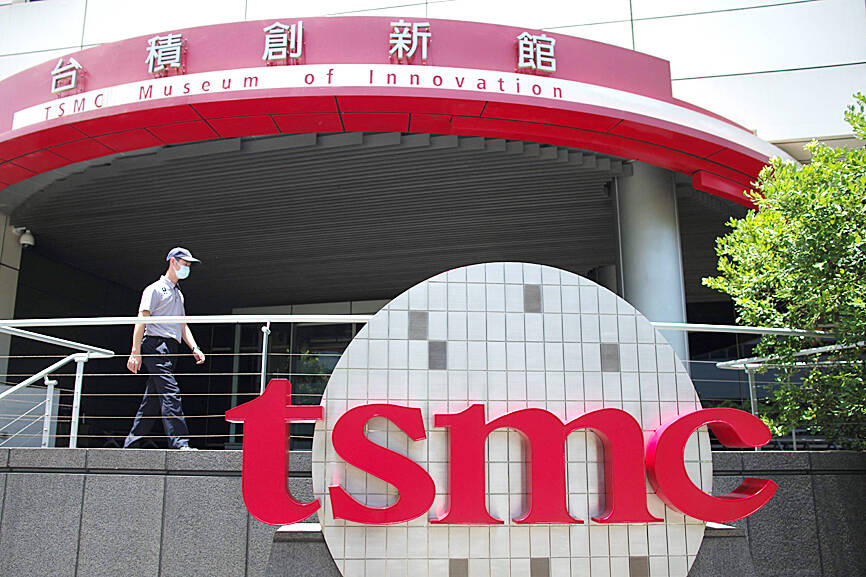Taiwan Semiconductor Manufacturing Co’s (TSMC, 台積電) board of directors yesterday approved capital appropriations of US$29.62 billion to install and upgrade the firm’s chip manufacturing process technologies, as well as its advanced and mature packaging technology capacity.
The capital expenditure budget would also be for fab construction and installation of manufacturing facilities, the world’s biggest contract chipmaker said in a statement.
TSMC did not comment on reports that it was in talks with flat-panel display maker Innolux Corp (群創) to acquire an idle plant as it prepares to convert manufacturing equipment into a new chip packaging production line that is to use fan-out panel-level packaging (FOPLP) technology.

Photo: AFP
Innolux said that about 60 percent of the idle plant’s manufacturing equipment could be reused for the FOPLP technology and its employees have a lot of experience and know-how about glass panel substrates, which are used in panel-level packaging to achieve heterogeneous integration of chips.
TSMC chairman C.C. Wei (魏哲家) last month told investors that the company was “looking at this kind of a panel-level fan-out technology,” as he believed the technology would be mature in about three years.
The chipmaker last month said it planned to spend US$28 billion to US$32 billion this year on new facilities and equipment, with a significant portion earmarked for advanced process technologies such as 2-nanometer technology.
About 10 percent of the capital budget would be for advanced packaging, testing and mask making, it said.
The board in the statement approved a cash dividend of NT$4 per share for the second quarter, as net profit was NT$247.85 billion (US$7.63 billion), or earnings per share of NT$9.56.
The board also gave the go-ahead for a new capital injection of up to US$7.5 billion to TSMC Arizona, a wholly owned subsidiary of TSMC, and the issuance of 2.353 million new “restricted shares” to attract and retain executives and talent, it said.

‘SWASTICAR’: Tesla CEO Elon Musk’s close association with Donald Trump has prompted opponents to brand him a ‘Nazi’ and resulted in a dramatic drop in sales Demonstrators descended on Tesla Inc dealerships across the US, and in Europe and Canada on Saturday to protest company chief Elon Musk, who has amassed extraordinary power as a top adviser to US President Donald Trump. Waving signs with messages such as “Musk is stealing our money” and “Reclaim our country,” the protests largely took place peacefully following fiery episodes of vandalism on Tesla vehicles, dealerships and other facilities in recent weeks that US officials have denounced as terrorism. Hundreds rallied on Saturday outside the Tesla dealership in Manhattan. Some blasted Musk, the world’s richest man, while others demanded the shuttering of his

Taiwan’s official purchasing managers’ index (PMI) last month rose 0.2 percentage points to 54.2, in a second consecutive month of expansion, thanks to front-loading demand intended to avoid potential US tariff hikes, the Chung-Hua Institution for Economic Research (CIER, 中華經濟研究院) said yesterday. While short-term demand appeared robust, uncertainties rose due to US President Donald Trump’s unpredictable trade policy, CIER president Lien Hsien-ming (連賢明) told a news conference in Taipei. Taiwan’s economy this year would be characterized by high-level fluctuations and the volatility would be wilder than most expect, Lien said Demand for electronics, particularly semiconductors, continues to benefit from US technology giants’ effort

ADVERSARIES: The new list includes 11 entities in China and one in Taiwan, which is a local branch of Chinese cloud computing firm Inspur Group The US added dozens of entities to a trade blacklist on Tuesday, the US Department of Commerce said, in part to disrupt Beijing’s artificial intelligence (AI) and advanced computing capabilities. The action affects 80 entities from countries including China, the United Arab Emirates and Iran, with the commerce department citing their “activities contrary to US national security and foreign policy.” Those added to the “entity list” are restricted from obtaining US items and technologies without government authorization. “We will not allow adversaries to exploit American technology to bolster their own militaries and threaten American lives,” US Secretary of Commerce Howard Lutnick said. The entities

Minister of Finance Chuang Tsui-yun (莊翠雲) yesterday told lawmakers that she “would not speculate,” but a “response plan” has been prepared in case Taiwan is targeted by US President Donald Trump’s reciprocal tariffs, which are to be announced on Wednesday next week. The Trump administration, including US Secretary of the Treasury Scott Bessent, has said that much of the proposed reciprocal tariffs would focus on the 15 countries that have the highest trade surpluses with the US. Bessent has referred to those countries as the “dirty 15,” but has not named them. Last year, Taiwan’s US$73.9 billion trade surplus with the US